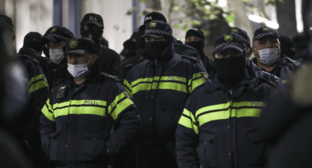18 June 2004, 15:16
European Court to hear six complaints from Chechnya
On September 23, 2004, the European Court of Human Rights will conduct hearings of six complaints from Russian citizens resident in the Chechen Republic that concern some developments in the armed conflict in the North Caucasus. These complaints were lodged in April and May 2002, assistance in doing paperwork provided to the applicants by lawyers from the Memorial Human Rights Center. The complaints were declared to the government of Russia in August 2000. Correspondence on these cases through the court between the representatives of the applicants and the representative of the Russian government continued in 2000-01. On December 19, 2002, the court passed a decision recognizing all these complaints acceptable.
Kirill Koroteev, a lawyer from the Memorial Human Rights Center, acts in court on behalf of the complainants along with Professor Bill Bowring of London Metropolitan University (starting from the summer of 2002). Human Rights Watch, the international human rights organization, in particular Human Rights Watch Moscow office director Diderick Lochman, provided assistance to the Memorial Human Rights Center in preparing the complaints and correspondence with the court.
Below are brief accounts of the six complaints. They are consolidated into three cases and will be heard simultaneously.
The first case unites the complaints from Magomed Akhmetovich Khashiev and Rosa Aribovna Akaeva. The complainants? relatives became victims of extrajudicial executions, torture and cruel and degrading treatment on the part of Russian service men during some ?clean-ups? in the Staropromyslovskii district in Grozny, Chechnya, in January 2000. The bodies of the first complainant?s brother and sister and his two nephews, as well as the second complainant?s brother, were found with sings of gunshot wounds. In spite that courts in Ingushetia established the fact of death of the complainants? relatives in February 2000, no legal action was taken until May. Investigation was then repeatedly suspended, resumed and again suspended.
The second case includes the complaints of Medka Chuchuevna Isaeva, Zina Abdulaevna Yusupova and Libkan Bazaeva. These complaints concern an air attack on a column of refugees trying to leave the Chechen Republic. The tragic event occurred on October 29, 1999. On that day, having learnt that there was a ?corridor? for leaving for Ingushetia, thousands of people decided to use that opportunity. However, the check-point on the border between Chechnya and Ingushetia turned out to be closed. Hundreds of vehicles with refugees stood on the highway in a column for a long time, but then they began to turn back to go along the Rostov-Baku highway towards Grozny. However, the column was suddenly attacked from air near Shaami-Yurt. Tens of people were killed or wounded. The first claimant?s two children and daughter-in-law died, the second claimant sustained a serious wound and the third claimant complains of a mental shock and destruction of her family's assets. Legal action on the fact of the people?s death was also taken only in May 2000, and it was later abandoned for lack of crime in the pilots? actions.
The third case contains the complaint lodged by Zara Adamovna Isaeva about developments in a bombardment of Katyr-Yurt in early February 2000. In late January that year, the federal command conducted a top secret special operation for having Chechen rebel units out from Grozny. Chechen commanders were misinformed that the rebels could allegedly simply buy from the Russian military a safe pullout from Grozny to the mountains along a certain route. They paid the pullout, but in reality minefields, prepared in advance, were awaiting the gunmen at the end of the way. Federal artillery and aircraft struck the villages along the route. The Chechen units sustained significant casualties, but civilian casualties were even higher. The complainant?s son and her three nieces died under attack. An investigation carried out by the prosecutor?s office coincided in its results with the investigation into the second case. The Russian government insists that the complainant?s relatives died as a result of the use of force that was absolutely necessary. Investigation into this case was also abandoned for lack of crime in the actions of the military command, the pilots and the artillerists.
In these cases, the complainants refer to Article 2 (?the right to life?) and Article 3 (?prohibition of torture") of the European Convention for the Protection of Human Rights and Fundamental Freedoms, as well as to Article 13 (?the right to an effective remedy"), with the exception of Libkan Bazaeva complaining that Article 1 (?protection of property?) of Protocol 1 to the Convention was violated. They contend the Russian troops unlawfully killed their relatives and subjected them to inhuman treatment, while the prosecution agencies did not conduct a due investigation.
On September 23, 2004, the European Court of Human Rights will conduct hearings of these cases. The representative of a complainant will be speaking the first 30 minutes and the representative of the Russian government will be speaking the next 30 minutes. The judges will then ask questions to the representatives of the parties, after which a ten-minute break will be announced. When the break is over, the parties will have ten minutes each (in the same order) to answer the questions of the judges and the arguments of the other party.
When the hearings are over, the court will start its deliberations. The final decisions will be passed later, the parties and the public to be notified of the date when they will be passed beforehand.
Source: Memorial Human Rights Center (Moscow, Russia)




